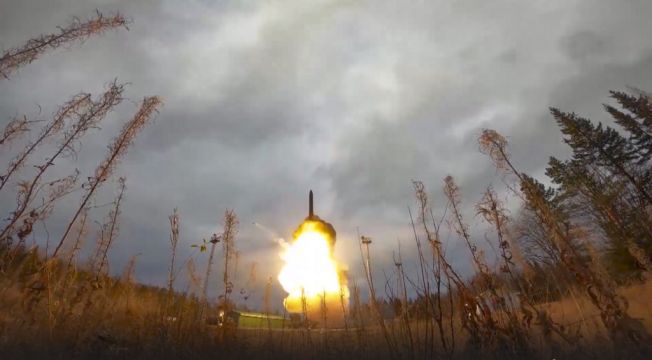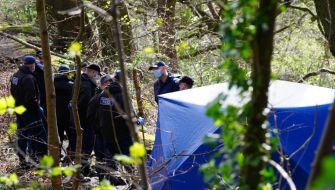Nato and Russia’s military have both staged planned annual nuclear exercises as the Russian president repeated the unfounded claim that Ukraine plans to set off a radioactive “dirty bomb”.
On the battlefront, Vladimir Putin’s forces targeted more than 40 villages around Ukraine over the past day.
The Russian president remotely monitored the drills of his strategic nuclear forces, which involved multiple practice launches of ballistic and cruise missiles in a show of force.
Russian defence minister Sergei Shoigu reported to Mr Putin that the exercise simulated a “massive nuclear strike” retaliating for a nuclear attack on Russia.

The Biden administration said Russia provided advance notice of the annual drills.
Nato is carrying out its own long-planned annual nuclear exercises in north-western Europe.
In remarks carried by Russian TV, Mr Putin said Ukraine plans to “use a so-called dirty bomb as a provocation” and contended the United States was using Ukraine as a “battering ram” against Russia and its regional allies, turning the country into a “testing ground for military-biological experiments”.
It was the first time Mr Putin himself made the dirty bomb allegation, which his officials have been repeating since last week.
Ukraine and its western allies have denied the claims and contend that Russia, facing setbacks on the battlefield, might try to detonate a “dirty bomb”, which uses explosives to scatter radioactive waste to sow terror.
Mr Shoigu on Wednesday called his counterparts from India and China to share Moscow’s concern about “possible Ukrainian provocations involving a ‘dirty bomb'”, according to the Russian Defence Ministry.
Nato secretary general Jens Stoltenberg called Russia’s unsubstantiated statements “absurd”.

“Allies reject this blatantly false accusation, and Russia must not use false pretexts to escalate the war further,” Mr Stoltenberg told reporters at Nato headquarters in Brussels on Wednesday.
He underlined that the 30-nation military organisation “will not be intimidated or deterred from supporting Ukraine’s right to self-defence for as long as it takes”.
Despite the western dismissals, Kremlin spokesman Dmitry Peskov insisted Moscow had information about “an ongoing preparation in Ukraine for such a terror attack”.
“We will continue to energetically inform the global community about what we know to persuade it to take action to prevent such irresponsible action by the regime in Kyiv,” Mr Peskov told reporters.
Slovenia’s government said Russia has been engaging in a disinformation campaign about the “dirty bombs”, using a 2010 photo from the European Union country’s Agency for Radioactive Waste titled: Ukraine’s capacities to create the dirty bomb.
The photo shows bags containing smoke detectors bearing inscriptions in Slovenian reading “radioaktivno”, or radioactive.
The Slovenian government says the detectors contain a radioactive source but is not one of those listed below the photo in the Russian Foreign Ministry release.

Slovenia’s government said on Twitter that its radioactive waste is stored safely and is not used for dirty bombs.
While continuing to issue unsubstantiated claims that Ukraine is planning provocations, Mr Putin is also still sending signals that he is open to negotiations with Kyiv.
The latest message came via Umaro Mokhtar Sissoco Embalo, President of Guinea Bissau, who visited Kyiv to meet with President Volodymr Zelensky.
“I was in Russia with President Putin, who asked me to forward you what we spoke about, something he thinks would be very important. He wishes and thinks that a direct dialogue should happen between your two countries,” the Guinea Bissau leader said.
At a press conference, Mr Zelensky responded that a prerequisite for talks would be Russia’s recognition of Ukraine’s territory, borders and sovereignty.
On the battlefront, Ukrainian officials said fighting in more than 40 villages killed at least two civilians and sustained the terror that forces people into air raid shelters each night.
Russian forces launched five rockets, 30 air strikes and more than 100 multiple-launch rocket system attacks on Ukrainian targets, the Ukrainian armed forces general staff said.
A Ukrainian official reported that a Russian strike hit a petrol station in the city of Dnipro, killing two people, including a 25-year-old pregnant woman in a car with her husband.
He was reported seriously hurt in the late Tuesday attack, which occurred just after the couple had refuelled their vehicle.
The governor of the Dnipropetrovsk region, Valentyn Reznichenko, said three other people were taken to hospital.

Ukrainian saboteurs attacked a police station in the southern port and industrial city of Kherson with grenades on Wednesday, Russian-installed officials reported on social media.
There were no immediate reports of casualties in the attack in the city bearing the same name as the region that Russia has illegally annexed.
Missiles struck buildings and neighbourhoods in the southern port city of Mykolaiv on Tuesday, though it remained unclear if there were any casualties, according to local authorities.
More strikes were reported early on Wednesday.
The sole food distribution point in Mykolaiv allows each person to receive free bread once every three days.
Many must walk long distances.
“Bread and canned food is all I eat. It’s almost winter already, and it’s terrifying,” Anna Bilousova, 70, said.

For 74-year-old Olena Motuzko, getting the food is an ordeal because she has a disabled husband she must leave alone for hours.
Others are trying to survive by going underground at night.
A 73-year-old woman spends her days in her home, cooking and washing, and every evening heads underground to a small makeshift sleeping area in a basement with family members.
She has been doing that every night since the war began in late February.
Valentyna, who asked that her last name not be used for security reasons, describes the sound of incoming attacks as “very scary”.
In the shelter, she and her family members count the blasts they hear, then check their phones to learn where they hit.
“My nervous system can’t cope with it,” she said, sitting in her makeshift bedroom.







